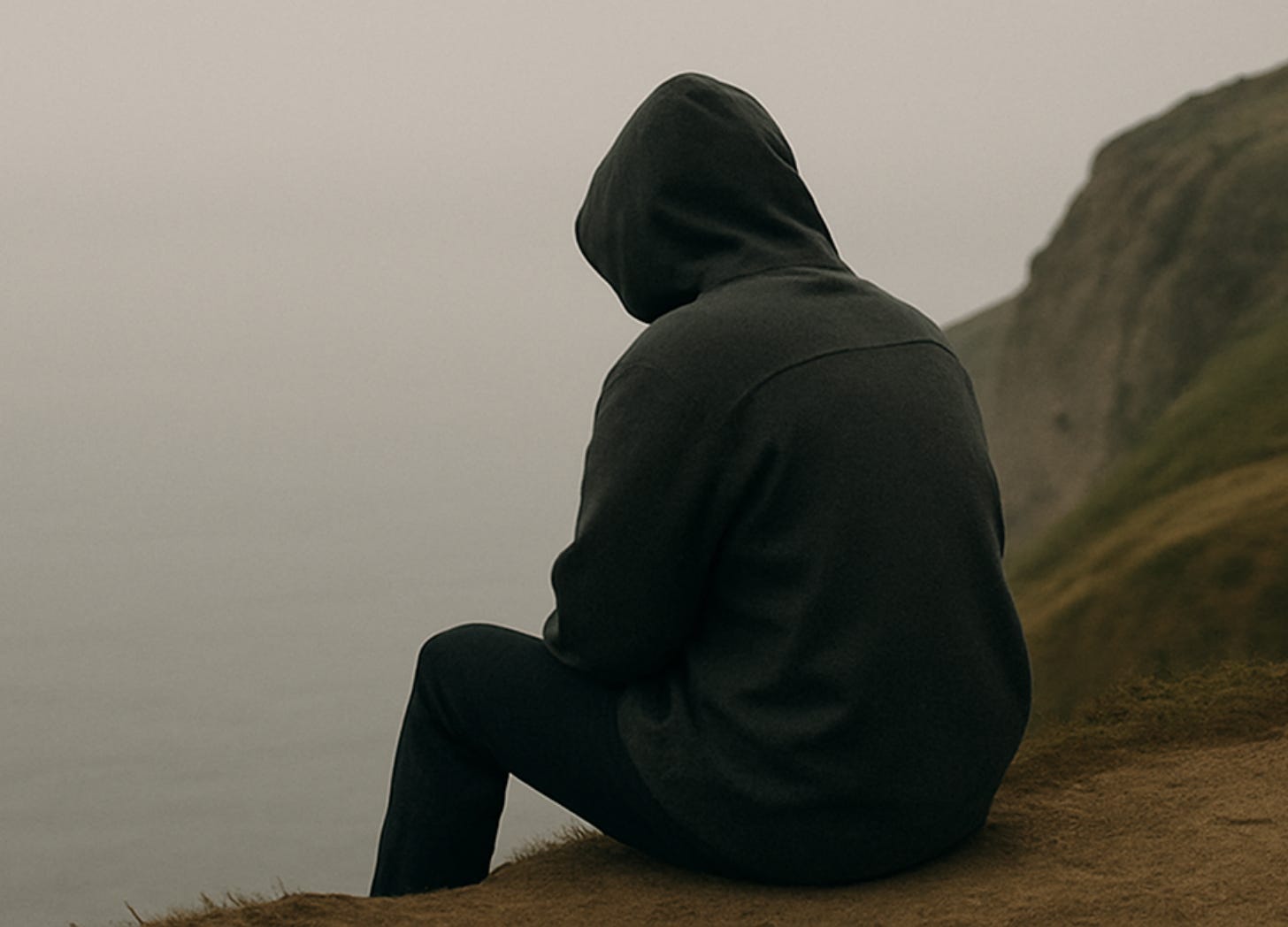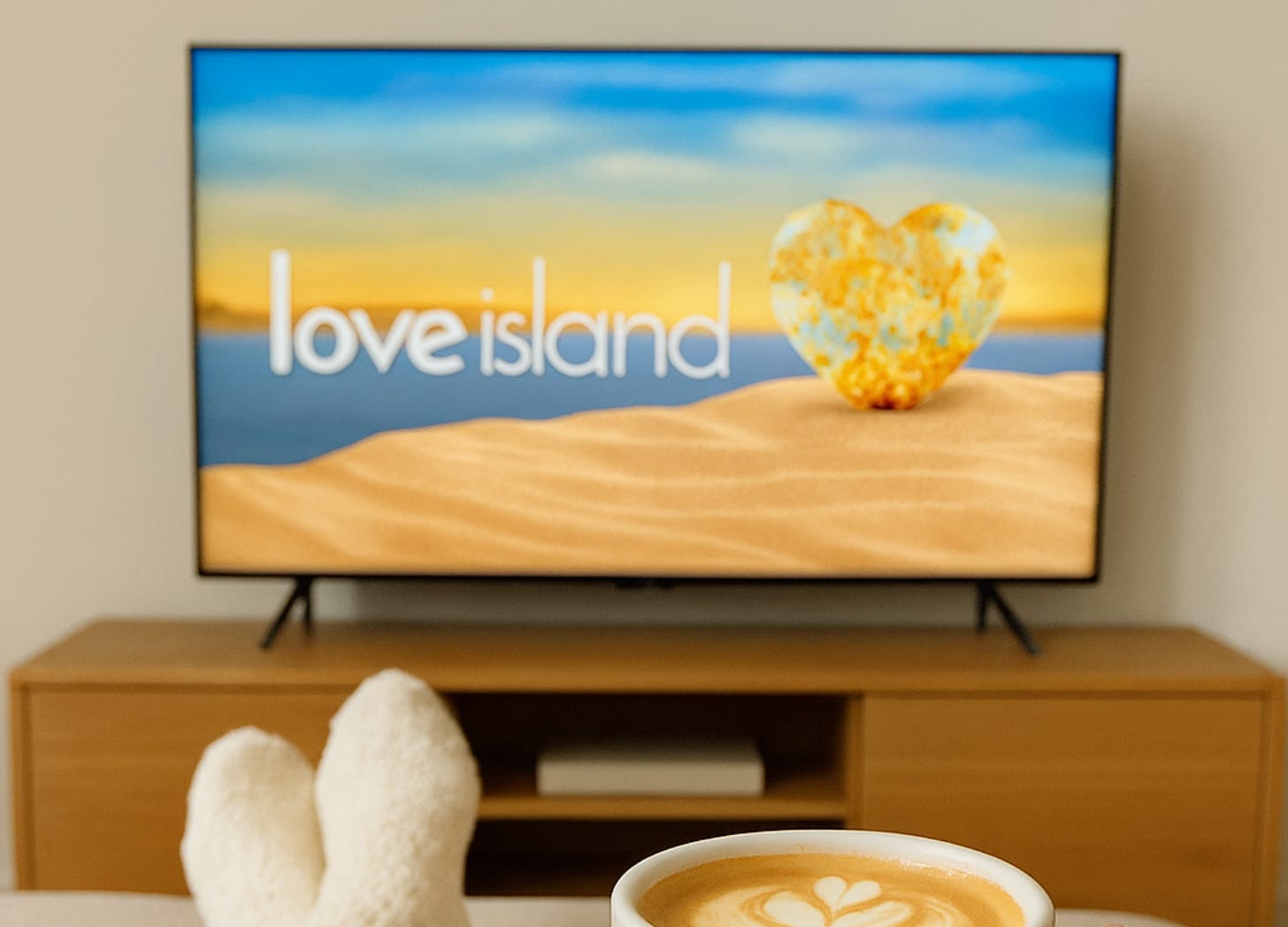Before the Emotional Cliff: The Struggles We Don't See
Why emotional care needs to begin before the breakdown; in the quiet moments, not just the loud ones.
Hey, checking in, because the quiet stuff matters too.
Today’s reflection: on the signs we miss, the slow unraveling we overlook, and why care should begin before the emotional cliff.
We know how to respond when someone’s clearly in distress. Maybe their emotions erupt like a shaken soda bottle, or they’re dangling from an emotional edge; either way, we leap into action. Hotlines buzz with activity, emergency rooms open their doors, and counselors scramble to provide urgent support. It’s the emotional equivalent of sending in the fire department when the house is already on fire (a pattern I wrote about in more detail here on why emotional hygiene shouldn't start with a fire alarm).
But here’s the thing: by the time someone’s in crisis, the emotional fire has often been smoldering quietly for a long time; mostly out of sight.
We focus so much on the cliff itself: the edge, the fall, the disaster. And forget about the long, slow walk leading up to it. The part of the story where someone is barely holding on; still functioning though, still “doing fine;” but inside, their world is shaking beneath the surface.
Crisis mode: what we see and what we miss
Picture this: a friend posts on social media about feeling suicidal. Suddenly, everyone rallies. Messages pour in. Calls are made. Help arrives. It’s urgent, and it’s necessary. That spotlight on crisis is life-saving.
But what about the weeks or months before that post? When that friend was sharing photos of their breakfast, smiling in group shots, and making it look like life was peachy? What about when they were messaging you but giving one-word answers? Or when they canceled plans “because they were tired,” but not that kind of tired; the kind that feels like the soul itself needs a nap?
That quiet period, without fireworks or sirens, is where most emotional suffering actually happens, often made up of tiny things that wear us down, slowly and invisibly. It’s easier to ignore because the signals are subtle and because society tends to reward “functioning” behavior. If someone shows up for work, answers emails, and laughs at the right moments, we tend to assume they’re okay.
We don’t rush in when someone seems “a little off.” We don’t check in when they’re still showing up, still replying, still performing “fine.” But by the time the crisis finally shows itself, the unraveling has often been happening for weeks, maybe months. The person didn’t suddenly break. They were slowly undoing.
The myth of the “sudden” crisis
If crises were like earthquakes, what we see is the shaking and destruction; the big drama. But underneath, there are always fault lines that have been slowly shifting for a long time (which, honestly, freaks me out) .
Emotional suffering is the same. It builds gradually, in small cracks, unnoticed shifts, and quiet tremors. But our mental health system is designed mostly for the aftershocks.
This is part of a bigger misunderstanding, what I call the myth of the sudden crisis.
The myth says breakdowns strike like lightning: fast, unexpected, out of the blue. But in reality, most emotional collapses are preceded by a long stretch of quiet struggle. Because we buy into this myth, we miss early warning signs; some obvious, some quieter. The moments when support could actually prevent the fall.
We wait for collapse. For pain to get louder. For crisis to “count.” We step in only once the distress is sharp enough, visible enough, undeniable.
But by then, the fraying has already taken root. The quiet indicators (skipped messages, tired smiles, small retreats) were there. We just didn’t think they counted.
Still showing up. Still unraveling.
We tend to imagine emotional collapse as dramatic, but more often, it looks ordinary.
Someone shows up for work, replies to messages, maybe even cracks a joke in the group chat.
Maybe they cancel plans a little more. Snap a little quicker. Say “just tired” a few too many times.
Maybe it’s you: nodding through a meeting while quietly unraveling on the inside.
These are the invisible stretches of suffering, when someone is “functioning,” but only barely. And here’s the kicker: people who look like they’re doing fine often don’t get much leeway. If you’re the strong one, the “together” one, people expect you to stay that way.
So when you finally whisper “I’m not okay,” you might get met with: “Same,” or worse, silence.
That’s the myth of the sudden crisis in action. We wait for distress to scream. But most of it whispers.

What if emotional care started before the cliff?
Here’s a thought experiment: what if, instead of waiting for the crisis, we started noticing the small signals much earlier? What if emotional care looked like gentle check-ins, regular “How are you really doing?” moments that don’t feel invasive or clinical, but just human?
Imagine a world where support is woven into the everyday, not just reserved for emergencies. Where the question “Are you okay?” is asked with curiosity, not judgment. Where it’s normal to say, “I’m feeling a bit off today,” without being branded as weak or “too much.”
This isn’t about turning everyone into therapists or obsessively monitoring moods. It’s about cultivating a culture of attention and kindness that notices the quiet distress signals; the ones that don’t come with flashing lights or sirens but are no less urgent.
The power of small, gentle check-ins
Small check-ins can be surprisingly powerful. Think of them as emotional pit stops on a long journey.
When a friend says, “I’m just tired,” instead of brushing it off, you could respond with, “I hear you. Want to talk about what’s wearing you down?”
At work or school, instead of measuring only output or performance, we could make more space to ask how people are really doing. No pressure, just quiet care.
Even within ourselves, the habit of noticing and naming emotions (“I’m anxious,” “I’m lonely,” “I’m frustrated”) can create a mental pause that prevents escalation.
And while all of this matters deeply, emotional care doesn’t always have to be serious. Sometimes, what steadies us is something a little more human, and a little more ridiculous.
Like texting your friend:
“Are you alive or just avoiding me like usual?”
(They might reply: “Alive-ish. Mostly surviving on coffee and bad decisions.”)
Or when you tell yourself:
“Hey brain, I know you want to catastrophize about tomorrow, but can we put that on hold? I have a show to binge.”
Humor can be a tool for connection and relief; a reminder that even in the quiet struggles, life has its absurd moments worth laughing about.
Changing the narrative: from crisis to care
If we shift our narrative from “waiting for the cliff” to “walking with people before the cliff,” we might prevent a lot of suffering.
It means recognizing that emotional health isn’t a binary state; not just “fine” or “broken.” It’s a spectrum, with lots of in-between spaces where people need support but don’t always get it.
It’s about offering care before the emergency, before the fire starts; and understanding that sometimes, that care is simply being present, listening, and showing up. These shifts don’t require grand transformations; just a little more noticing, a little more kindness. Here are a few gentle ways to start:
Here’s how we can start caring earlier
Notice the small things. Cancelled plans, quiet answers, or a sudden joke that feels more like a mask; these are clues, not excuses.
Ask gently. “How are you doing?” can feel like a loaded question, so try, “I’ve been thinking about you. Want to chat?”
Create space for honesty. Make it okay to say, “I’m not okay today,” without shame.
Practice self-check-ins. You don’t have to be perfect at this. Just ask yourself, “How am I holding up?” and be honest.
Use humor to lighten the load. Laughter doesn’t fix everything, but it can make the journey easier.
And… because emotional healing isn’t always grand gestures, here’s a little honest check-in from me:
One thing that grounded me this week:
Drinking my latte with extra foam, no phone, just me and a binge-watch of Love Island, where somehow everyone is both emotionally unavailable and crying. Honestly, it made my own mess feel impressively low-drama.
One thing that ungrounded me:
Telling someone I was “just tired,” hoping they’d ask how I really was… and they just said “same” and changed the subject. Cool cool cool.
Your turn. What’s one small thing that grounded or ungrounded you this week?
If you’re new here, here’s your soft landing.
If you’ve been feeling the weight of caring for yourself, you might also appreciate When Self-Care Starts to Feel Like Work.


